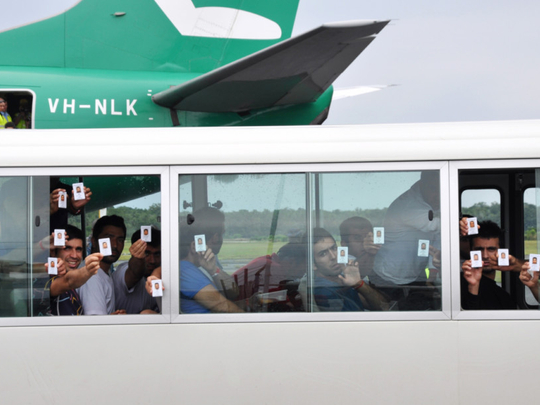
It is not a secret that the offshore detention on Nauru and Manus Island of asylum seekers trying to reach Australia by boat is inhumane. But the Nauru files recently published by the Guardian are still shocking. The leaked incident reports document assaults, sexual abuse and self-harm attempts mostly among the most vulnerable: children. They are a stain on Australia’s conscience and its international reputation.
Yet, the federal government is unrepentant. The phobia that Australia might be overrun by “boat people” seemingly trumps everything else. Anything is acceptable, it seems, to stop the boats. But it isn’t. Throwing desperate people fleeing death and persecution in prison on small Pacific islands for having the temerity to seek refuge in Australia isn’t just morally wrong, it’s irrational, illegal and prohibitively expensive to boot. It must stop.
Australia is a wonderfully diverse country that is generally welcoming to foreigners. The arrival of some 200,000 immigrants a year is relatively uncontroversial; 28.5 per cent of the population was born abroad. But that generally open attitude makes the paranoia about the perceived threat posed by relatively small numbers of boat people seem all the more irrational. Unauthorised arrivals by boat totalled fewer than 70,000 people between 1990 and 2013. That is a drop in the ocean for a country of 24 million people. Australia is not in danger of being “swamped”.
While the number of people detained offshore is relatively small and had fallen to some 1,300 at the end of June, the cost of locking them up is large. Each person detained offshore in terrible conditions costs Australian taxpayers an eye-watering A$430,000 (Dh1.2 million) a year each, according to the National Commission of Audit. Just think how much those people could contribute to Australian society if only a small fraction of that amount was instead spent on welcoming them and getting them into work. The evidence is clear. The Australian government allocated A$27.8 million in fiscal year 2014-15 to support 2,750 “authorised onshore arrivals” (people who arrive in Australia with a visa and then seek asylum), amounting to A$10,100 per person. That much smaller fiscal outlay is repaid many times over as refugees start working and contributing to society, as many economic studies show.
Having a lot to contribute to Australia
Indeed, investing one dollar in helping refugees can yield nearly two dollars in economic benefits within five years, according to my own recent study, published by Open, the international think-tank that I founded, and the Tent Foundation, whose mission is to help forcibly displaced people. So even from a heartless, self-interested economic point of view, it is perverse to lock up at prohibitive expenses people who have a lot to contribute to Australia. There is also the small matter of international law.
Earlier this year, the high court ruled that offshore detention was lawful under Australia’s constitution. But Australia is also a party to the 1967 Protocol Relating to the Status of Refugees, an international treaty that extends the protections of the 1951 Refugee Convention to non-Europeans. The convention states that asylum-seekers should not be penalised for their unauthorised entry to a country, provided they present themselves to the authorities without delay and show good cause for their unauthorised entry. Article 31.2 stipulates that receiving states “shall not apply to the movements of such refugees restrictions other than those which are necessary and such restrictions shall only be applied until their status in the country is regularised or they obtain admission into another country”.
Lawyers can, of course, debate to what extent Australia’s restrictions are “necessary”. But however you interpret the convention, it certainly does not permit indefinite detention in inhumane conditions with no possibility for those with legitimate asylum claims to gain refugee status in Australia. Economics and the law are both important. But the overriding argument is a moral one. It cannot be right to inflict such suffering on people who have committed no crime, the vast majority of whom are later found to be refugees.
The federal government’s argument that locking people up saves lives by deterring others from coming is bogus. If the government was really concerned about asylum seekers’ welfare, it wouldn’t treat them so badly. And yes, people smugglers are often nasty people. But that doesn’t make punishing innocent asylum-seekers acceptable. The government of Papua New Guinea has just decided to shut the detention centre on Manus Island .
It’s time for Nauru to close its doors too.
— Guardian News & Media Ltd
Philippe Legrain writes about global and European political and economic issues. An economic adviser to the president of the European Commission until February 2014, his latest book is European Spring: Why Our Economies and Politics are in a Mess — and How to Put Them Right.









